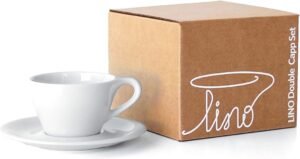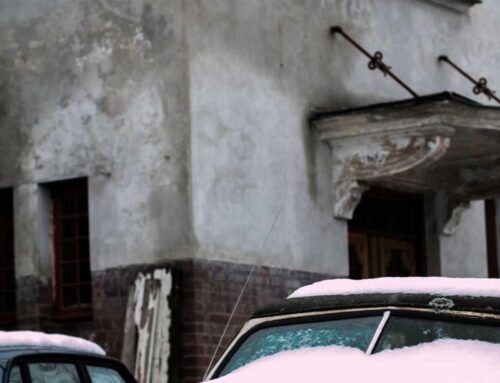The best espresso cups are important for enjoying espresso. They’re not just regular cups; they’re designed to make your espresso taste better and keep it warm. In this discussion about the best espresso cups, we’ll look at what makes them special, like their design, what they’re made of, and how they work, to help you find the perfect cup for your espresso enjoyment. When you hear the word “espresso,” you might think of busy Italian cafes where people drink strong, dark coffee from small ceramic cups. These cups, called demitasse or espresso cups, are made just for enjoying espresso. They have thick walls to keep the espresso hot, but their shape is important too. According to Tom Valentine, who works at Crema Coffee Roasters, they’re usually narrow at the bottom and wider at the top. This helps keep the heat in and makes the coffee smell better.
Personally, I don’t have a strong preference either way, which explains why my kitchen is filled with a diverse assortment of espresso cups! Aesthetics: When picking out an espresso cup, it’s important to think about how it looks and how it’s made. The style and design can affect how easy it is to hold and wash. Valentine suggests choosing a cup that matches the overall look of your café or home. Also, a cup with thicker walls is less likely to break if it gets dropped, especially if someone’s hands are a bit shaky.
Top Ten Best Espresso Cups
By now, you should have a good idea of what you’re looking for in an espresso cup. So, without waiting any longer, let’s dive into my list of the top 10 espresso cups.
Best Espresso Cup with saucers
notNeutral Lino 3-Ounce Espresso Gift Set

People who love coffee know that having the right equipment is really important. Espresso machines and grinders can be complicated, so it’s easy to forget about the simple demitasse cup. But even though it’s just a basic kitchen item, the way it’s designed can affect how good your espresso tastes and how much you enjoy drinking it.
what to look for an espresso cups
Material: In the coffee world on Instagram, glass is the trendy choice for espresso cups. Personally, I’m a big fan of double-walled borosilicate glass cups because they keep the espresso hot and look really cool. It’s satisfying to watch the espresso pour into a glass cup. However, porcelain and ceramic remain popular materials for espresso cups due to their excellent heat retention and classic appearance. According to experts like Valentine and Solomon, porcelain and ceramic cups are the best at keeping espresso warm while also being affordable. Although double-walled glass cups are praised for their heat retention, some find them less durable compared to high-quality ceramic options. Stainless steel cups, on the other hand, are not favored by coffee experts because they can give the espresso a metallic taste. Dimensions: Considering the size of the demitasse cup is also important. Solomon advises that it should be large enough for a comfortable grip yet small enough to allow for a fragrant aroma as you take a sip. Moreover, if you plan to brew your espresso directly into the cup, it’s essential to ensure that it fits neatly under the group head of your espresso machine to facilitate seamless brewing.
Design: In recent years, espresso specialists have shifted towards favoring tapered shapes over the traditional straight-sided cups, recognizing their ability to enhance the enjoyment and appreciation of espresso. This evolution in design not only facilitates easier sipping but also aids in the formation of crema during the extraction process. Concurrently, the importance of handles has diminished with the rise of double-walled construction, reflecting changing preferences in espresso cup aesthetics.
When it comes to choosing the perfect espresso cup, individual tastes hold sway. Some argue for the inclusion of a saucer, deeming it an essential accompaniment for serving espresso, while others dismiss it as entirely unnecessary. Regardless of personal preference, an ideal espresso cup should have the capacity to hold anywhere from a standard one-ounce shot to a double shot, leaving sufficient space for the crema to prevent spillage. Cups with a capacity ranging from two to four ounces are considered optimal for espresso, while larger vessels, typically holding 12 to 16 ounces, are recommended for milk-based beverages like lattes and cappuccinos, accommodating espresso, milk, and foam.
Personally, I don’t have a strong preference either way, which explains why my kitchen is filled with a diverse assortment of espresso cups! Aesthetics: When picking out an espresso cup, it’s important to think about how it looks and how it’s made. The style and design can affect how easy it is to hold and wash. Valentine suggests choosing a cup that matches the overall look of your café or home. Also, a cup with thicker walls is less likely to break if it gets dropped, especially if someone’s hands are a bit shaky.
Top Ten Best Espresso Cups
By now, you should have a good idea of what you’re looking for in an espresso cup. So, without waiting any longer, let’s dive into my list of the top 10 espresso cups.
Best Espresso Cup with saucers
notNeutral Lino 3-Ounce Espresso Gift Set








Leave A Comment